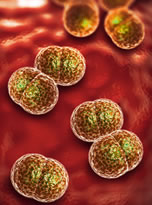Read and report vaccine reactions, harassment and failures.

Meningococcal disease is a bacterial illness caused by the aerobic, gram-negative bacteria Neisseria meningitidis (N. meningitidis). Thirteen types (serogroups) of N. Meningitis or meningococci have been identified with six found to be responsible for epidemics resulting in invasive meningococcal disease. These six serogroups include A, B, C, X, W and Y. Most frequently, invasive meningococcal disease can cause inflammation of the protective membranes (meninges) covering the brain and spinal cord (meningitis) and a serious bloodstream infection (septicemia/meningococcemia).
Symptoms of meningitis begin to appear between three and seven days after exposure to meningococcal bacteria and may appear mild and similar to cold or flu symptoms and may include headache, fever, aches and pains.
As the illness progresses, additional symptoms can include skin rash, severe headache, stiff neck, nausea, vomiting, inability to look at bright lights, mental confusions and irritability, extreme fatigue/sleepiness, convulsions and unconsciousness. In babies, symptoms can include a high-pitched moaning cry, difficulty or refusal to feed, and the fontanel, the soft area on the top of the head, may also be bulging.
Meningitis is the most common presentation of invasive meningococcal disease and accounts for approximately 75 percent of all cases. Humans are the only species known to carry N. meningitidis and invasive meningococcal disease most frequently occurs in late winter or early spring.
Approximately 10-20 percent of adolescents and adults are asymptomatic carriers of meningococci. Although they have no symptoms of the disease, they carry the bacteria in the back of their throat and can transmit the disease to others. Less than one percent of individuals who carry meningococci will develop invasive meningococcal disease. Invasive disease occurs when the meningococci bacteria pass through the mucous cells and invades the bloodstream. Often, invasive meningococcal disease has occurred after the development of an upper respiratory infection.
Mothers who have innate immunity transfer maternal antibodies to their infants to protect them for the first few months of life until they can make their own antibodies.
Meningococcal disease is not easily spread.
NVIC “Quick Facts” is not a substitute for becoming fully informed about Meningococcal disease, meningitis and the Meningococcal vaccine. NVIC recommends consumers read the more complete information following the "Quick Facts", as well as the vaccine manufacturer product information inserts, and speak with one or more trusted health care professionals before making a vaccination decision for yourself or your child.



